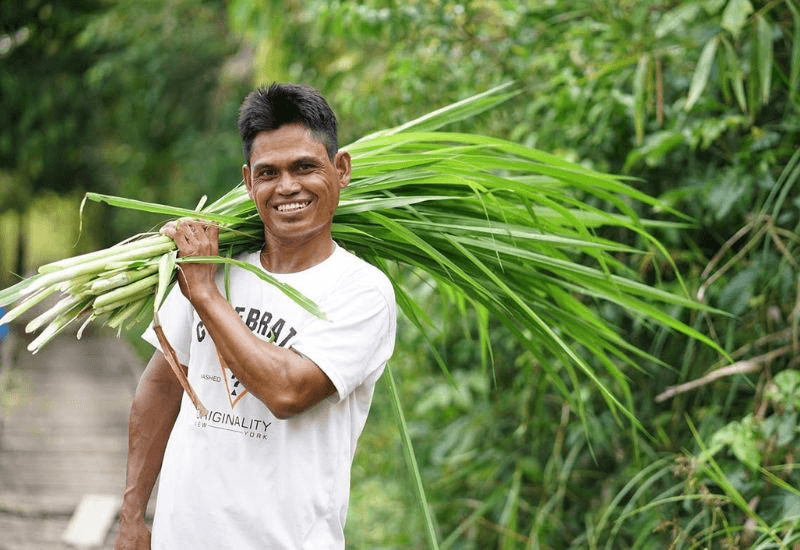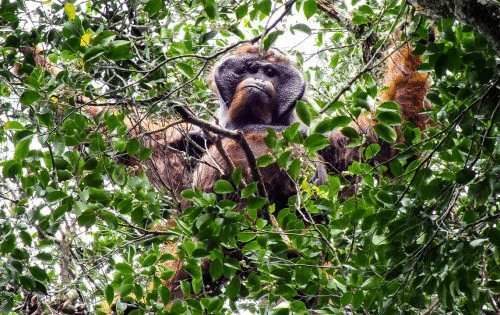
have us call you right now.
Katingan Peatland Restoration and Conservation Project
Katingan Peatland Restoration and Conservation Project
Katingan, Borneo, Indonesia
Katingan, Borneo, Indonesia
4.6/5.0
4.6/5.0
Verra CCB Gold
Verra CCB Gold
Oxford Category:
4
4
Buyer Protection



9,299
Hectares restored
7,500,000
tCO2e removed



711
Species protected



500+
Jobs created



45,000
People supported
Carbon impact
The Katingan Peatland Restoration and Conservation Project is one of the world’s largest forest-based avoided emissions initiatives, protecting and restoring 149,800 hectares of tropical peatland in Central Kalimantan, Indonesia. Peatlands are among the most effective carbon sinks on Earth, storing vast amounts of carbon- up to 20 times more below ground than in above-ground vegetation. By preventing the conversion of this land into industrial plantations, the project avoids the release of an estimated 546.75 million tons of peat carbon and 14.25 million tons of above-ground biomass carbon.
Annually, the project prevents the emission of about 7.5 million tons of CO₂, equivalent to taking 2 million cars off the road each year. The project’s activities - such as fire prevention, rewetting drained peatlands, and forest protection - directly contribute to climate mitigation by keeping stored carbon out of the atmosphere and sequestering additional emissions. It is certified under the Verra Verified Carbon Standard (VCS) and the Climate, Community & Biodiversity (CCB) standard.

Impact on biodiversity
The Katingan peatland is a biodiversity hotspot, home to over 390 species, including 6 critically endangered, 11 endangered, and 27 vulnerable species. Notably, it hosts more than 5% of the global population of the Bornean Orangutan, as well as other high-conservation-value species like the Proboscis Monkey and Sunda Pangolin.
The project’s restoration and protection efforts- such as controlling illegal hunting, replanting degraded areas, and maintaining intact forests - ensure the long-term survival of these species and their habitats. The area’s rich biodiversity is further supported by the project’s measures to stabilize water flows, prevent peat fires, and enrich soil nutrients, all of which are vital for ecosystem health

Impact on local communities
The project brings meaningful socio-economic benefits to the 34 villages within and around the project area. It creates sustainable livelihood opportunities, such as agroforestry, eco-tourism, and non-timber forest product harvesting, which help local communities transition away from unsustainable practices. The project also provides vocational training, micro-finance loans, and supports traditional activities like farming and fishing.
By involving communities in participatory planning and offering alternative income sources, the project not only reduces poverty but also strengthens local capacity to resist large-scale land conversion threats, such as oil palm plantations. The project’s approach ensures that benefits are long-lasting and inclusive, fostering both economic resilience and environmental stewardship.

Carbon impact
The Katingan Peatland Restoration and Conservation Project is one of the world’s largest forest-based avoided emissions initiatives, protecting and restoring 149,800 hectares of tropical peatland in Central Kalimantan, Indonesia. Peatlands are among the most effective carbon sinks on Earth, storing vast amounts of carbon- up to 20 times more below ground than in above-ground vegetation. By preventing the conversion of this land into industrial plantations, the project avoids the release of an estimated 546.75 million tons of peat carbon and 14.25 million tons of above-ground biomass carbon.
Annually, the project prevents the emission of about 7.5 million tons of CO₂, equivalent to taking 2 million cars off the road each year. The project’s activities - such as fire prevention, rewetting drained peatlands, and forest protection - directly contribute to climate mitigation by keeping stored carbon out of the atmosphere and sequestering additional emissions. It is certified under the Verra Verified Carbon Standard (VCS) and the Climate, Community & Biodiversity (CCB) standard.

Impact on biodiversity
The Katingan peatland is a biodiversity hotspot, home to over 390 species, including 6 critically endangered, 11 endangered, and 27 vulnerable species. Notably, it hosts more than 5% of the global population of the Bornean Orangutan, as well as other high-conservation-value species like the Proboscis Monkey and Sunda Pangolin.
The project’s restoration and protection efforts- such as controlling illegal hunting, replanting degraded areas, and maintaining intact forests - ensure the long-term survival of these species and their habitats. The area’s rich biodiversity is further supported by the project’s measures to stabilize water flows, prevent peat fires, and enrich soil nutrients, all of which are vital for ecosystem health

Impact on local communities
The project brings meaningful socio-economic benefits to the 34 villages within and around the project area. It creates sustainable livelihood opportunities, such as agroforestry, eco-tourism, and non-timber forest product harvesting, which help local communities transition away from unsustainable practices. The project also provides vocational training, micro-finance loans, and supports traditional activities like farming and fishing.
By involving communities in participatory planning and offering alternative income sources, the project not only reduces poverty but also strengthens local capacity to resist large-scale land conversion threats, such as oil palm plantations. The project’s approach ensures that benefits are long-lasting and inclusive, fostering both economic resilience and environmental stewardship.

Carbon impact
The Katingan Peatland Restoration and Conservation Project is one of the world’s largest forest-based avoided emissions initiatives, protecting and restoring 149,800 hectares of tropical peatland in Central Kalimantan, Indonesia. Peatlands are among the most effective carbon sinks on Earth, storing vast amounts of carbon- up to 20 times more below ground than in above-ground vegetation. By preventing the conversion of this land into industrial plantations, the project avoids the release of an estimated 546.75 million tons of peat carbon and 14.25 million tons of above-ground biomass carbon.
Annually, the project prevents the emission of about 7.5 million tons of CO₂, equivalent to taking 2 million cars off the road each year. The project’s activities - such as fire prevention, rewetting drained peatlands, and forest protection - directly contribute to climate mitigation by keeping stored carbon out of the atmosphere and sequestering additional emissions. It is certified under the Verra Verified Carbon Standard (VCS) and the Climate, Community & Biodiversity (CCB) standard.

Impact on biodiversity
The Katingan peatland is a biodiversity hotspot, home to over 390 species, including 6 critically endangered, 11 endangered, and 27 vulnerable species. Notably, it hosts more than 5% of the global population of the Bornean Orangutan, as well as other high-conservation-value species like the Proboscis Monkey and Sunda Pangolin.
The project’s restoration and protection efforts- such as controlling illegal hunting, replanting degraded areas, and maintaining intact forests - ensure the long-term survival of these species and their habitats. The area’s rich biodiversity is further supported by the project’s measures to stabilize water flows, prevent peat fires, and enrich soil nutrients, all of which are vital for ecosystem health

Impact on local communities
The project brings meaningful socio-economic benefits to the 34 villages within and around the project area. It creates sustainable livelihood opportunities, such as agroforestry, eco-tourism, and non-timber forest product harvesting, which help local communities transition away from unsustainable practices. The project also provides vocational training, micro-finance loans, and supports traditional activities like farming and fishing.
By involving communities in participatory planning and offering alternative income sources, the project not only reduces poverty but also strengthens local capacity to resist large-scale land conversion threats, such as oil palm plantations. The project’s approach ensures that benefits are long-lasting and inclusive, fostering both economic resilience and environmental stewardship.

Carbon impact
The Katingan Peatland Restoration and Conservation Project is one of the world’s largest forest-based avoided emissions initiatives, protecting and restoring 149,800 hectares of tropical peatland in Central Kalimantan, Indonesia. Peatlands are among the most effective carbon sinks on Earth, storing vast amounts of carbon- up to 20 times more below ground than in above-ground vegetation. By preventing the conversion of this land into industrial plantations, the project avoids the release of an estimated 546.75 million tons of peat carbon and 14.25 million tons of above-ground biomass carbon.
Annually, the project prevents the emission of about 7.5 million tons of CO₂, equivalent to taking 2 million cars off the road each year. The project’s activities - such as fire prevention, rewetting drained peatlands, and forest protection - directly contribute to climate mitigation by keeping stored carbon out of the atmosphere and sequestering additional emissions. It is certified under the Verra Verified Carbon Standard (VCS) and the Climate, Community & Biodiversity (CCB) standard.

Impact on biodiversity
The Katingan peatland is a biodiversity hotspot, home to over 390 species, including 6 critically endangered, 11 endangered, and 27 vulnerable species. Notably, it hosts more than 5% of the global population of the Bornean Orangutan, as well as other high-conservation-value species like the Proboscis Monkey and Sunda Pangolin.
The project’s restoration and protection efforts- such as controlling illegal hunting, replanting degraded areas, and maintaining intact forests - ensure the long-term survival of these species and their habitats. The area’s rich biodiversity is further supported by the project’s measures to stabilize water flows, prevent peat fires, and enrich soil nutrients, all of which are vital for ecosystem health

Impact on local communities
The project brings meaningful socio-economic benefits to the 34 villages within and around the project area. It creates sustainable livelihood opportunities, such as agroforestry, eco-tourism, and non-timber forest product harvesting, which help local communities transition away from unsustainable practices. The project also provides vocational training, micro-finance loans, and supports traditional activities like farming and fishing.
By involving communities in participatory planning and offering alternative income sources, the project not only reduces poverty but also strengthens local capacity to resist large-scale land conversion threats, such as oil palm plantations. The project’s approach ensures that benefits are long-lasting and inclusive, fostering both economic resilience and environmental stewardship.

What is AFOLU?
AFOLU (Agriculture, Forestry, and Other Land Use) refers to a sector defined by the Intergovernmental Panel on Climate Change (IPCC) that encompasses all human activities on land affecting greenhouse gas (GHG) emissions and carbon sequestration. It includes:
Agriculture: crop and livestock production, soil management, and fertilizer use.
Forestry: deforestation, afforestation, reforestation, and forest management.
Other Land Use: wetland drainage, peatland degradation, urbanization, and land conversion.
AFOLU is a major contributor to global emissions (accounting for ~23% of anthropogenic GHGs) but also a critical solution for climate mitigation through carbon sequestration, sustainable land management, and restoration. The sector is central to nature-based climate strategies, including reforestation, agroforestry, and soil carbon enhancement, while addressing food security, biodiversity, and rural livelihoods. It is a key focus in national climate plans (NDCs) and carbon markets due to its dual role as both a source and sink of CO₂.
Certification Standard



This project is verified by Verified Carbon Standard (Verra). VCS was established in 2007 and is a full-fledged carbon offset program developed and run by the non-profit Verra. It focuses on GHG reduction attributes only and does not require projects to have additional environmental or social benefits. The VCS is broadly supported by the carbon offset industry (project developers, large offset buyers, verifiers, and projects consultants) and is active globally.
Gallery


























Gallery


























Gallery


























Gallery


























Location
Katingan, Borneo, Indonesia
Katingan, Borneo, Indonesia
United Nations' Sustainable Development Goals

Over 500 local community members were hired full-time under project and received insurance and pensions.

25 community-based health programmes in 20 villages supported. 100 farmers joined agroecology school.

Over 800 locals have better access to healthcare of which 600 are women.

Educational assistance to 6 villages. Online training for 70 elementary school teachers in 17 villages.

Equal salary policy. Microfinancing program to expand job opportunities for women.

80 new land-based latrines in 6 villages. Over 1,000 people have increased access to clean water and sanitation.

Microfinancing to over 110 women and 214 men in over 7 villages. 72 farmers trained to improve crop revenue.

20 villages are actively involved in forest protection activities such as prevention of forest fires.

1,375 ha replanted forest with about 185,000 seedlings. 32,100,000 tCO2e emission reductions to date.

44 IUCN vulnerable or endangered species in project area, a.o. 5-10% of remaining Bornean Orangutan population.

Third party audits on national and international level. Robust anti-corruption measures in place.

Close partnerships, e.g. cooperation with police department to prevent illegal logging.
United Nations' Sustainable Development Goals

Over 500 local community members were hired full-time under project and received insurance and pensions.

25 community-based health programmes in 20 villages supported. 100 farmers joined agroecology school.

Over 800 locals have better access to healthcare of which 600 are women.

Educational assistance to 6 villages. Online training for 70 elementary school teachers in 17 villages.

Equal salary policy. Microfinancing program to expand job opportunities for women.

80 new land-based latrines in 6 villages. Over 1,000 people have increased access to clean water and sanitation.

Microfinancing to over 110 women and 214 men in over 7 villages. 72 farmers trained to improve crop revenue.

20 villages are actively involved in forest protection activities such as prevention of forest fires.

1,375 ha replanted forest with about 185,000 seedlings. 32,100,000 tCO2e emission reductions to date.

44 IUCN vulnerable or endangered species in project area, a.o. 5-10% of remaining Bornean Orangutan population.

Third party audits on national and international level. Robust anti-corruption measures in place.

Close partnerships, e.g. cooperation with police department to prevent illegal logging.
United Nations' Sustainable Development Goals

Over 500 local community members were hired full-time under project and received insurance and pensions.

25 community-based health programmes in 20 villages supported. 100 farmers joined agroecology school.

Over 800 locals have better access to healthcare of which 600 are women.

Educational assistance to 6 villages. Online training for 70 elementary school teachers in 17 villages.

Equal salary policy. Microfinancing program to expand job opportunities for women.

80 new land-based latrines in 6 villages. Over 1,000 people have increased access to clean water and sanitation.

Microfinancing to over 110 women and 214 men in over 7 villages. 72 farmers trained to improve crop revenue.

20 villages are actively involved in forest protection activities such as prevention of forest fires.

1,375 ha replanted forest with about 185,000 seedlings. 32,100,000 tCO2e emission reductions to date.

44 IUCN vulnerable or endangered species in project area, a.o. 5-10% of remaining Bornean Orangutan population.

Third party audits on national and international level. Robust anti-corruption measures in place.

Close partnerships, e.g. cooperation with police department to prevent illegal logging.
United Nations' Sustainable Development Goals

Over 500 local community members were hired full-time under project and received insurance and pensions.

25 community-based health programmes in 20 villages supported. 100 farmers joined agroecology school.

Over 800 locals have better access to healthcare of which 600 are women.

Educational assistance to 6 villages. Online training for 70 elementary school teachers in 17 villages.

Equal salary policy. Microfinancing program to expand job opportunities for women.

80 new land-based latrines in 6 villages. Over 1,000 people have increased access to clean water and sanitation.

Microfinancing to over 110 women and 214 men in over 7 villages. 72 farmers trained to improve crop revenue.

20 villages are actively involved in forest protection activities such as prevention of forest fires.

1,375 ha replanted forest with about 185,000 seedlings. 32,100,000 tCO2e emission reductions to date.

44 IUCN vulnerable or endangered species in project area, a.o. 5-10% of remaining Bornean Orangutan population.

Third party audits on national and international level. Robust anti-corruption measures in place.

Close partnerships, e.g. cooperation with police department to prevent illegal logging.
Regreener's Rating
The Katingan Peatland Restoration and Conservation Project in Indonesia stands out as a high-impact, nature-based climate solution that effectively addresses both carbon reduction and broader sustainability goals. Its focus on peatland restoration - a critical yet frequently overlooked ecosystem - highlights its potential to deliver meaningful emissions reductions while supporting local communities and biodiversity. Certification under a respected standard adds a layer of credibility, ensuring robust carbon accounting and transparency. However, like all land-based projects, its long-term success depends on sustained community engagement and strong governance to mitigate risks such as leakage or reversals. The project’s integrated approach, combining environmental and social outcomes, positions it as a strong option for organizations seeking high-integrity carbon credits. In a market where quality varies widely, Katingan’s commitment to holistic impact makes it a noteworthy choice for those prioritizing both climate action and sustainable development.
1
1
2
2
3
3
4
4
5
5
0
1
2
3
4
4.9
5
Evaluates the overall project design, methodology, goals and set-up.
Evaluates the overall project design, methodology, goals and set-up.
Evaluates the overall project design, methodology, goals and set-up.
General Project Details
General Project Details
General Project Details
4.6
4.6
Evaluates actual, verifiable GHG reductions (CO₂-equivalent tonnage, permanence).
Evaluates actual, verifiable GHG reductions (CO₂-equivalent tonnage, permanence).
Evaluates actual, verifiable GHG reductions (CO₂-equivalent tonnage, permanence).
Carbon Impact
Carbon Impact
Carbon Impact
4.3
4.3
Assesses the positive impact on biodiversity, local communities, and ecosystem resilience.
Assesses the positive impact on biodiversity, local communities, and ecosystem resilience.
Assesses the positive impact on biodiversity, local communities, and ecosystem resilience.
Co-benefits
Co-benefits
Co-benefits
4.6
4.6
Evaluates project accountability, monitoring accuracy, and the reliability of reported outcomes.
Evaluates project accountability, monitoring accuracy, and the reliability of reported outcomes.
Evaluates project accountability, monitoring accuracy, and the reliability of reported outcomes.
Reporting & dMRV
Reporting & dMRV
Reporting & dMRV
4.2
4.2
Reviews alignment with standards, market credibility, and reputation protection.
Reviews alignment with standards, market credibility, and reputation protection.
Reviews alignment with standards, market credibility, and reputation protection.
Compliance & Reputation
Compliance & Reputation
Compliance & Reputation
4.9
4.9
Start supporting this high-quality project
Enter your details and out team will reach out about next steps.
Start supporting this high-quality project
Enter your details and out team will reach out about next steps.
Start supporting this high-quality project
Enter your details and out team will reach out about next steps.

